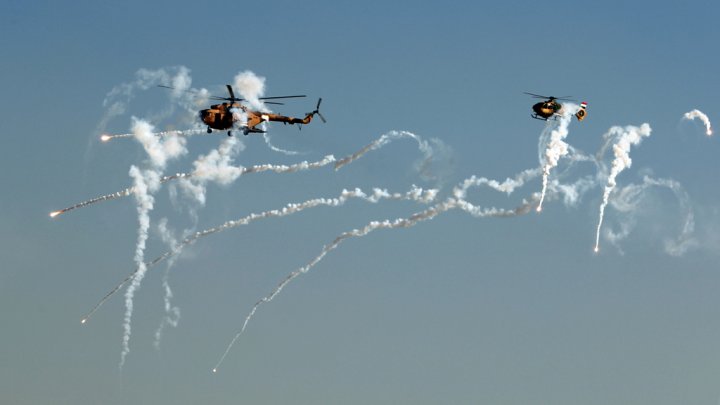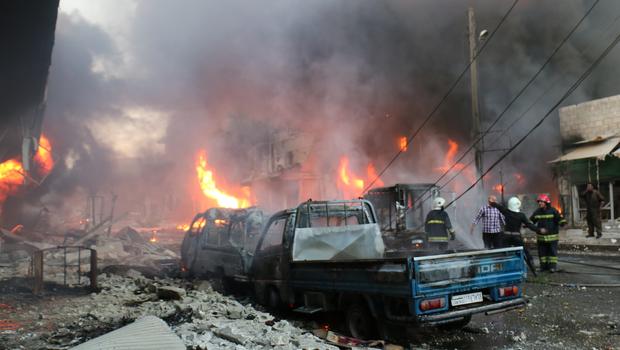www.aljazeerah.info
News, April 2014
Archives
Mission & Name
Conflict Terminology
Editorials
Gaza Holocaust
Gulf War
Isdood
Islam
News
News Photos
Opinion Editorials
US Foreign Policy (Dr. El-Najjar's Articles)
www.aljazeerah.info
|
Editorial Note: The following news reports are summaries from original sources. They may also include corrections of Arabic names and political terminology. Comments are in parentheses. |
50 Syrians Killed, Scores Injured in Damascus and Aleppo, Iraqi Helicopters Attack Syrian Fighters
April 29, 2014
 |
 |
| Iraqi helicopters attacking Syrian fighters | Site of Aleppo government attacks |
Attacks hit Syria's 2 major cities, kill 50 people
ALBERT AJI and BARBARA SURK Associated Press
The Detroit News, April 29, 2014
Damascus, Syria —
Two car bombs exploded in a pro-government neighborhood in the central Syrian city of Homs Tuesday, killing at least 36 people just hours after one of the deadliest mortar strikes in the heart of the capital, Damascus, killed 14, officials and state media said.
The attacks came a day after President Bashar Assad declared his candidacy for the June 3 presidential elections, a race he is likely to win amid a raging civil war that initially started as an uprising against his rule. Such attacks are common in Homs and Damascus, and there was no immediate indication that Tuesday’s violence was directly related Assad’s announcement.
A Syrian government official said two car bombs in Homs exploded in the city’s predominantly Alawite district of Zahra. Along with the 36 killed, 85 people were wounded in the attack, the official told The Associated Press by telephone from Homs. He spoke on condition of anonymity because he was not authorized to talk to media.
The Britain-based Syrian Observatory for Human Rights said at least 37 people, including five children, were killed and that more than 80 were wounded in the double car bombing Homs. Syria state TV only said the car bomb in Homs caused “a large number” of casualties.
In Damascus, several mortar shells slammed into the predominantly Shiite neighborhood of Shaghour in the morning hours, killing 14 people and wounding 86, Syria’s official SANA news agency and state TV reported.
It was one of the deadliest mortar attacks in central Damascus since the conflict began in March 2011.
No one immediately claimed responsibility for the Homs and Damascus attacks Tuesday.
Rebels fighting to oust Assad from power have frequently fired mortars into the capital from opposition-held suburbs. Armed opposition groups have also attacked Syria’s cities with car bombs in the past months. An al-Qaida-linked group has previously claimed responsibility for several car bombs in the capital and other cities.
Many of the opposition-held neighborhoods around Damascus have been under a crippling government blockade for months, with no food and medicine allowed to reach trapped civilians inside.
SANA blamed the attacks on terrorists — a term used by Assad’s government for rebels.
The Observatory also reported the mortar attack in Damascus, saying 17 people were killed. The group, which tracks the conflict through a network of activists on the ground, said the death toll was likely to rise because of the many wounded.
The conflicting numbers could not immediately be reconciled but different casualty tolls are common in the immediate aftermath of large bombings.
An official at the Damascus Police Command told the Associated Press that two of the mortar shells landed near a religious school in the capital. Several students who were attending classes at the school were among those killed and wounded in the attack, said the official, speaking on condition of anonymity in line with government regulations.
Homs has been the opposition stronghold since the beginning of the uprising against Assad that erupted in March 2011. The city, Syria’s third largest, has been the scene of some of the fiercest fighting in the civil war that followed the initially largely peaceful revolt. The conflict has killed more than 150,000 people, and forced another 2.5 million to flee the country.
Also Tuesday, the international chemical weapons watchdog said it will send a team to Syria to investigate recent allegations about the use of chlorine gas in the war.
The Organization for the Prohibition of Chemical Weapons said in a statement that the Syrian government has agreed to the mission, and will provide security in areas under its control. The OPCW the team is expected to depart for Syria soon.
Syrian opposition forces have accused the government of attacking rebel-held areas with chlorine gas several times in recent months. Syria denies the allegations.
A joint U.N.-OPCW mission is already in the process of eliminating Syria’s chemical weapons stockpile. It has removed more than 90 percent of Syria’s declared chemical stockpile.
While chlorine was first deployed militarily in World War I, it is no longer officially considered a warfare agent and was not among the chemicals declared by Syria when it joined the chemical weapons treaty.
Meanwhile, four more presidential hopefuls declared their candidacy in Syria’s June 3 presidential election, bringing the total number of registered contenders to 11, state TV said.
Syria’s opposition and its Western backers have criticized the decision to hold presidential elections while the country is engulfed in fighting.
Syria’s Foreign Ministry rejected the criticism, saying the decision was “sovereign” and warned that “no foreign power will be allowed to intervene” in the process.
In Tehran, meanwhile, Iranian Foreign Ministry spokeswoman Marzieh Afkham welcomed the elections, saying the vote will be “an opportunity for peace and stability” in Syria.
Iran has backed Assad throughout the conflict, providing his government with millions of dollars in economic aid and military support through its Lebanese proxy, Hezbollah.
“We think the election is a step closer to ending the crisis, stopping the war and support for peace and stability in Syria,” Afkham said.
Rockets strike mainly Shiite area of central Damascus
France 24, April 29, 2014
At least four mortar shells struck the mainly Shiite district of Shaghour in central Damascus on Tuesday, killing 12 people and wounding 50 others, state media reported.
"Twelve citizens were killed and 50 others wounded by terrorists who targeted the Shaghour neighbourhood in Damascus with four mortar shells," the SANA news agency said.
Two shells hit the Badr al-Din al-Hussein technical institute, the agency reported.
The Syrian government and state media use the term "terrorists" to refer to the opposition rebels seeking to overthrow President Bashar al-Assad's government.
The Damascus Police Command and the Syrian Observatory for Human Rights also reported the mortar attack, with the Observatory saying at least eight people were dead and that the death toll was expected to rise.
Rebel forces arrayed in positions on the outskirts of the capital regularly fire mortar shells and rockets into the heart of Damascus, often killing civilians.
Shaghour is a district in the Old City, which has frequently been hit by rebel fire.
The attack came a day after President Bashar al-Assad announced he would seek re-election in a June 3 vote, despite international calls for him to step down and a more than three-year-long uprising against his rule.
The United Nations, as well as US, French and Turkish leaders, have publicly called for Assad to resign.
A UN investigation into human rights violations in Syria implicated Assad in war crimes in February of last year. The UN inquiry cited “massive evidence” linked to “the highest level of government”.
Assad’s forces have pushed back the mainly Sunni opposition rebels from many of their strongholds around the capital, but residents say they have stepped up rocket and mortar attacks against the heart of the city in recent weeks.
(FRANCE 24 with AFP and REUTERS)
Iraqi helicopters strike Syrian fuel tanker convoy
France 24, April 28, 2014
Iraqi military helicopters on Sunday struck a convoy of fuel tankers in Syria, killing at least eight, in what is believed to be the first attack claimed by Baghdad since the Syrian civil war began, a government spokesman said.
Interior Ministry spokesman Saad Maan Ibrahim said the operation took place near the Iraqi border, adding that intelligence reports suggested the convoy was aiming to supply an al-Qaida spin-off group with fuel.
"The army struck eight tanker trucks in Wadi Suwab inside Syrian territory as they were trying to enter Iraqi territory to provide the Islamic State of Iraq and the Levant (ISIL) with fuel," Maan said.
ISIL has been controlling areas in Iraq’s Anbar province since December along with other Sunni insurgent groups. Since then, government forces and allied Sunni tribal militia have been trying to dislodge the militants from parts of the provincial capital, Ramadi, and the nearby town of Fallujah, but have made no significant progress.
The attack is believed to be the first strike claimed by Iraq inside Syria since the uprising against Syrian President Bashar al-Assad broke out in March 2011.
The crisis in Syria is estimated to have claimed 50,000 lives so far.
ISIL emerged in Iraq in the wake of the US-led invasion in 2003, and later expanded into Syria during the uprising against Assad.
Maan said "there was no coordination with the Syrian regime" over the strike.
"Our responsibility now is to protect our border and to protect the border from the other side, because there is no protection from the other side," he said.
(FRANCE 24 with AP, AFP)
Syria mortar fire kills 12 in Damascus as rights group accuses regime of barrel bombing civilians
CBS, April 29, 2014
DAMASCUS, Syria --
Syrian state media said mortar shells exploded Tuesday in central Damascus, killing 12 people and wounding scores.
The official SANA news agency said four shells struck in the capital's Shaghour neighborhood on Tuesday morning, as the violence in Syria's three-year civil war continued unabated. More than 150,000 people have been killed already and millions displaced from their homes.
An official at the Damascus Police Command told The Associated Press that at least 50 people were wounded in the attack and that two of the mortar shells hit a school complex. The official spoke on condition of anonymity in line with regulations.
SANA said terrorists were behind the attacks - a term used by President Bashar Assad's government for rebels fighting to oust him.
No one immediately claimed responsibility for the attack. Rebels have frequently fired mortars into the capital from Damascus' opposition-held suburbs.
The Damascus mortar attacks came as an international rights organization accused the Syrian government of indiscriminately targeting civilians and civilian infrastructure with crude bombs in rebel-held districts of the northern city of Aleppo.
Human Rights Watch says its activists have documented 85 locations in Aleppo's opposition-held districts that government aircraft shelled with barrel bombs - makeshift, shrapnel-packed explosive devices rolled out of helicopters.
The New York-based group says in a report Tuesday that the attacks occurred between Feb. 22 and April 2.
The U.N. Security Council is meeting on Wednesday to review whether Syria's warring sides are complying with a resolution demanding the cessation of the use of barrel bomb and other weapons in populated areas.
HRW activists identified the locations after interviewing witnesses and analyzing satellite imagery and video and photographic evidence.
Fair Use Notice
This site contains copyrighted material the
use of which has not always been specifically authorized by the copyright
owner. We are making such material available in our efforts to advance
understanding of environmental, political, human rights, economic,
democracy, scientific, and social justice issues, etc. We believe this
constitutes a 'fair use' of any such copyrighted material as provided for
in section 107 of the US Copyright Law. In accordance with Title 17 U.S.C.
Section 107, the material on this site is
distributed without profit to those
who have expressed a prior interest in receiving the included information
for research and educational purposes. For more information go to: http://www.law.cornell.edu/uscode/17/107.shtml.
If you wish to use copyrighted material from this site for purposes of
your own that go beyond 'fair use', you must obtain permission from the
copyright owner.
|
|
|
|
||
|
||||||


